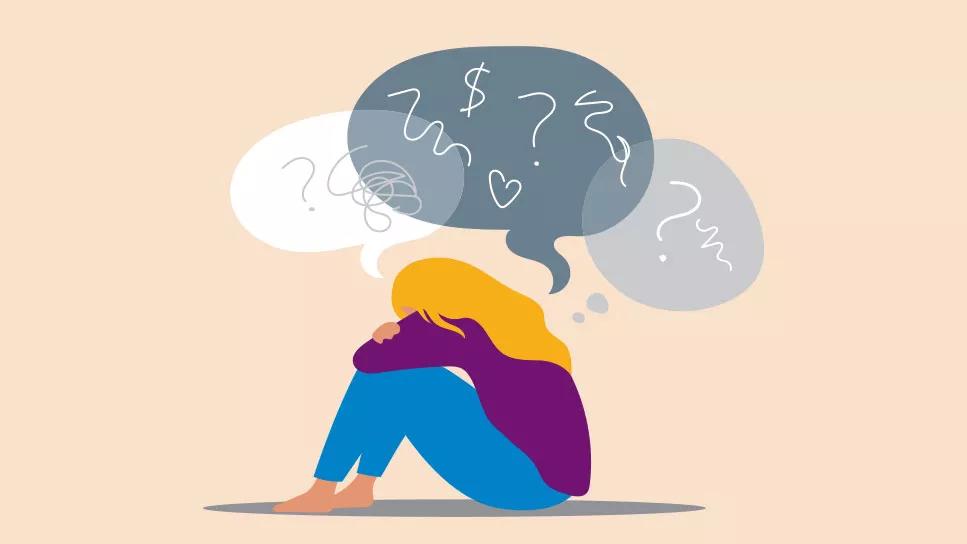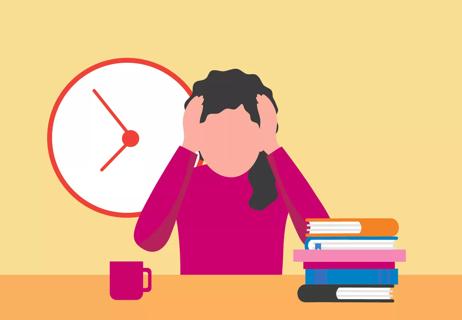Although different conditions, they can occur together or cause one another

“How are you?” The answer to this question is sometimes more complicated than the person asking may realize. You might blurt out a quick, “Fine, thanks!” even when you know you’re not.
Advertisement
Cleveland Clinic is a non-profit academic medical center. Advertising on our site helps support our mission. We do not endorse non-Cleveland Clinic products or services. Policy
That’s because it can be hard to admit you need help. But if you know you’re feeling … different, but you don’t know why, defining the problem is a whole other story. If lately, your mood and energy have significantly changed, you may be wondering if you have anxiety or depression (or both).
Anxiety can make you feel high-alert and full of dread. Depression can leave you in a low, even hopeless mood. And while that makes these conditions sound very different, they are more intertwined than they might seem. And they commonly occur together.
Psychiatrist Karen Jacobs, DO, gives us an overview of what anxiety and depression are, how they manifest in different ways, how they can be related and how to tell the difference between the two.
While anxiety and depression have their own symptoms and clinical features, there’s some overlap.
In the same way, there’s a difference between normal worry and anxiety.
“It’s OK to worry from time to time about how you’ll do on a test or about talking to your boss about a raise,” clarifies Dr. Jacobs. “But if it starts becoming persistent and reaching across all areas of your life, then that might be a signal that you’re dealing with something bigger.”
Advertisement
Symptoms of generalized anxiety disorder include:
In addition, there’s a multitude of physical symptoms that can occur with anxiety, including:
A prolonged state of anxiety, which constantly triggers your fight-or-flight response, can have major consequences on your health. Dr. Jacobs says it’s so important to seek treatment if you’re experiencing these symptoms.
A depression diagnosis goes far beyond just having the blues. The big difference between sadness and clinical depression is that, with sadness, the symptoms are not nearly as severe or persistent. In other words, they don’t interfere with your ability to function on a day-to-day basis when you’re just sad or having a bad day.
Depression affects your mood and ability to function. Hallmark signs of depression include:
Anxiety and depression are both common mental health disorders that can affect your ability to go about your daily tasks and live your life fully.
Additionally, they also share some symptoms. Both anxiety and depression can cause:
If you’re experiencing any of these symptoms, it’s important to let a healthcare provider know.
If you’re experiencing changes in your mood and you’re trying to sort out whether it may be depression or anxiety — or both — pay attention to your energy level and your attitude toward the future. Depression tends to come with lower energy and a loss of interest or motivation to do things. Meanwhile, anxiety can cause you to feel high-strung and energized, often fueled by racing thoughts and worry.
Another big difference between anxiety and depression also comes in the treatment of each condition. It’s important to speak to your therapist, psychiatrist or healthcare provider to make sure you’re getting the right treatment.
Yes, it’s actually common for people to experience anxiety and depression simultaneously. According to the Anxiety & Depression Association of America, almost half of people who are diagnosed with depression are also diagnosed with anxiety.
Advertisement
In fact, in many cases, one may have caused the other.
“It’s almost like we’re trying to sort out the chicken and the egg. We’re trying to figure out which one occurred first, and then if one caused the other,” explains Dr. Jacobs. “For example, feeling depressed can cause us to worry, and worrying can cause us to become depressed.”
So, if you’re not able to leave the house due to severe anxiety, this can lead you to feel isolated or alone, which can spiral into depression. In the same way, if you’re experiencing depression, you may start to feel anxiety about the work or chores you aren’t accomplishing.
Depression can also create a sense of anxious distress about losing control of yourself. When this happens, you can also be at greater risk for self-harm. In this situation, intensive treatment can be very helpful for managing depression accompanied by anxious distress, so it’s important to reach out for help.
Whether they occur together or separately, depression and anxiety are both treatable. Most people benefit from psychotherapy (talk therapy), cognitive behavioral therapy (CBT), medication or a combination.
And education and transparency are some of the biggest ways to diminish the stigma that surrounds mental health so people can get the help they need. If you or someone you know needs help, reach out to a mental health expert or connect with a resource or support group, like:
Advertisement
When it comes to figuring out if you have anxiety or depression, it’s OK not to have all the answers right away. But if you find yourself going through each day saying you’re “fine” when what you really feel is the complete opposite, it’s important to take intentional steps to heal.
Your mental health may feel like a tangled knot sometimes, but that doesn’t mean it can’t be untangled with the help of self-care, support and proper treatment.
Advertisement
Learn more about our editorial process.
Advertisement

Going home isn’t always easy, but there are ways to ease any stress you might feel

Managing stress can help you sleep more soundly

This fast-acting anxiety medication should never be taken with alcohol, despite what you may see on The White Lotus

Deep breathing, positive mantras and tackling negative thoughts can help get you out of your head and cool down your anxiety

Focusing on what you can see, feel, touch and hear can help you feel more present in the moment

Performance anxiety and stage fright are outsized stress responses that can creep up when you’re put on the spot

A healthy amount of anxiety can keep you safe from harm and motivate you to take action

Breathwork, sleep meditation and avoiding screens can help fight back morning anxiety

Wearing a scarf, adjusting your outdoor activities and following your asthma treatment plan can help limit breathing problems

Your diet in the weeks, days and hours ahead of your race can power you to the finish line

When someone guilt trips you, they’re using emotionally manipulative behavior to try to get you to act a certain way